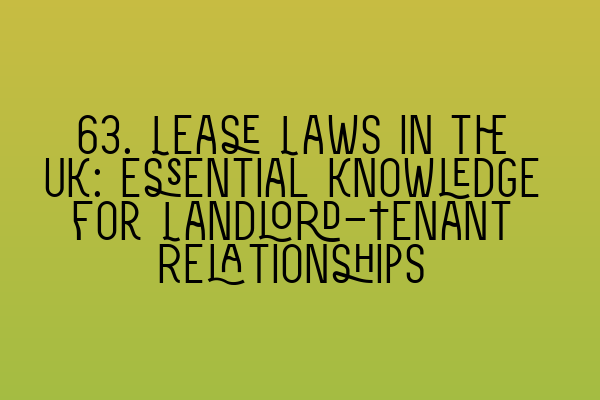**63. Lease Laws in the UK: Essential Knowledge for Landlord-Tenant Relationships**
Are you a landlord or a tenant in the UK? Understanding lease laws is crucial for a harmonious and legally compliant landlord-tenant relationship. The intricacies of lease laws ensure that both parties are protected and their rights are safeguarded. In this article, we will delve into the essential knowledge you need to know about lease laws in the UK.
**What is a Lease?**
A lease is a legal agreement between a landlord and a tenant that outlines the terms and conditions of renting a property. It establishes the rights and responsibilities of both parties, ensuring a mutually beneficial agreement.
**Types of Leases**
There are different types of leases available in the UK, each with its own set of rules and regulations. The most common types include:
1. Assured Shorthold Tenancy (AST) – This is the default tenancy for most residential properties in the UK. It provides certain rights and protections to both landlords and tenants, such as a minimum term of six months and the ability to serve a section 21 notice to regain possession of the property.
2. Common Law Tenancy – This type of tenancy is rare and occurs when there is no written agreement between the landlord and tenant. It is essential to have a written agreement in place to avoid potential disputes and ensure legal compliance.
3. Commercial Lease – Commercial leases are specifically designed for businesses renting commercial properties. These leases differ significantly from residential leases and can include complex clauses related to rent reviews, repairs and maintenance, and lease length.
4. Secure Tenancy – Secure tenancies are typically provided by local authorities or housing associations. They offer long-term security for tenants, as well as various rights and protections.
**Key Terms in a Lease Agreement**
Understanding the key terms in a lease agreement is crucial for both landlords and tenants. Here are some essential terms you should be familiar with:
1. Rent – The amount of money the tenant agrees to pay the landlord for the use of the property. It is important to clearly specify rent amounts, due dates, and accepted payment methods in the lease agreement.
2. Security Deposit – This is a sum of money paid by the tenant at the beginning of the tenancy to protect the landlord against any damage or unpaid rent. The deposit must be protected in a government-approved scheme to ensure its safekeeping.
3. Repair and Maintenance – The lease agreement should clearly stipulate the repair and maintenance responsibilities of both the landlord and the tenant. This includes who is responsible for repairs, general maintenance, and keeping the property in good condition.
4. Termination Clause – The termination clause outlines the conditions under which the lease can be terminated by either party. It is advisable to seek legal advice when drafting or terminating a lease to ensure compliance with the law.
**Legal Rights and Responsibilities**
Both landlords and tenants have legal rights and responsibilities that must be upheld throughout the tenancy. Some key rights and responsibilities include:
1. Right to Quiet Enjoyment – Tenants have the right to live peacefully and without interference from the landlord. Landlords must ensure quiet enjoyment is not violated, such as by carrying out unnecessary inspections or intruding on the tenant’s privacy.
2. Repairs and Maintenance – Landlords are responsible for ensuring the property is safe and in good repair. Tenants should promptly report any repair issues to the landlord or property management company.
3. Health and Safety – Landlords must comply with health and safety regulations, ensuring the property meets all necessary safety standards. Tenants should also maintain the property in a safe and sanitary condition.
4. Rent Payments – Tenants must pay rent on time and in full, as specified in the lease agreement. Failure to pay rent can lead to eviction proceedings. Landlords must provide proper notice before increasing rent or making any changes to the tenancy terms.
**Seeking Legal Advice**
Lease laws can be complex, and it is advisable to seek legal advice when dealing with lease agreements and any potential disputes. SQE Property Law & Land Law Solicitors can provide expert advice and guidance to ensure compliance with UK lease laws.
In conclusion, understanding lease laws is crucial for both landlords and tenants in the UK. By familiarizing yourself with the types of leases, key terms, and legal rights and responsibilities, you can ensure a smooth and legally compliant tenancy. If you require further information or legal assistance, contact SQE Property Law & Land Law Solicitors.
